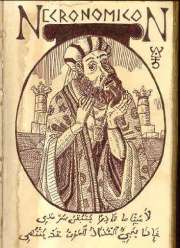|
Biografie Abdul al-Hazred
Abdul Alhazred is a fictional character created by American horror writer H. P. Lovecraft. He is the so-called "Mad Arab" credited with authoring the imaginary book Kitab al-Azif (the Necronomicon), and as such an integral part of Cthulhu Mythos lore. Despite the existence of several hoax Necronomicons, it is clear that neither Alhazred nor his book ever existed.
The name Abdul Alhazred is a pseudonym that Lovecraft created in his youth, which he took on after reading 1001 Arabian Nights at the age of about five years. The name was invented either by Lovecraft, or by Albert Baker, the Phillips family lawyer. Abdul is a common Arabic name component (but never a name by itself; additionally the ending -ul and the beginning Al- are redundant), but Alhazred may allude to Hazard, a name from Lovecraft's family tree. It might also have been a pun on "all-has-read", since Lovecraft was an avid reader in youth.
Abdul Alhazred is not a real Arabic name, and seems to contain the Arabic definite article morpheme al- twice in a row (anomalous in terms of Arabic grammar). The more proper Arabic form might be Abd-al-Hazred or Abdul Hazred. In Arabic translations, his name has appeared as Abdullah Alḥaẓred (عبدالله الحظرد): Arabic ḥaẓraحظر = "he fenced in", "he prohibited". Hazred could come from the Persian or Arabic word "Hazrat" meaning Great Lord with a twist that makes it sound like "red" and "hazard" both indicative of danger. However Abdul is a common Arabic prefix meaning "Servant of" and "Al" is Arabic for "the", and if "hazra" means "he prohibited", "he fenced in" or "Great Lord", then the name would mean "Servant of the Prohibited", "Servant of the Fenced in", or "Servant of the Great Lord" which would make sense considering his role, even if it is not a proper Arabic name.
Similarly, an article (written from an in-universe perspective) in the Call of Cthulhu RPG speculates that it may be a corruption of Abd Al-Azrad, which it claims translates to The Worshipper of the Great Devourer.
The phrase "mad Arab", sometimes with both words capitalized in Lovecraft's stories, is used so commonly before Alhazred's name that it almost constitutes a title. A reference to the "Mad Arab" in Cthulhu Mythos fiction is invariably a synonym for Abdul Alhazred.
According to Lovecraft's "History of the Necronomicon" (written 1927, first published 1938), Alhazred was:
a mad poet of Sanaá, in Yemen, who is said to have flourished during the period of the Ommiade caliphs, circa 700 A.D. He visited the ruins of Babylon and the subterranean secret of Memphis and spent ten years alone in the great southern desert of Arabia—the Roba El Khaliyeh or "Empty Space" of the ancients—and "Dahna" or "Crimson" desert of the modern Arabs, which is held to be inhabited by protective evil spirits and monsters of death. Of this desert many strange and unbelievable marvels are told by those who pretend to have penetrated it. In his last years Alhazred dwelt in Damascus.
In 730, while still living in Damascus, Alhazred supposedly wrote a book of ultimate evil in Arabic, al-Azif, which would later become known as the Necronomicon. Those who have dealings with this book usually come to an unpleasant end, and Alhazred was no exception. Again according to Lovecraft's "History":
Of his final death or disappearance (738 A.D.) many terrible and conflicting things are told. He is said by Ebn Khallikan (12th cent. biographer) to have been seized by an invisible monster in broad daylight and devoured horribly before a large number of fright-frozen witnesses. Of his madness many things are told. He claimed to have seen the fabulous Irem, or City of Pillars, and to have found beneath the ruins of a certain nameless desert town the shocking annals and secrets of a race older than mankind. He was only an indifferent Moslem, worshipping unknown entities whom he called Yog-Sothoth and Cthulhu.
|





